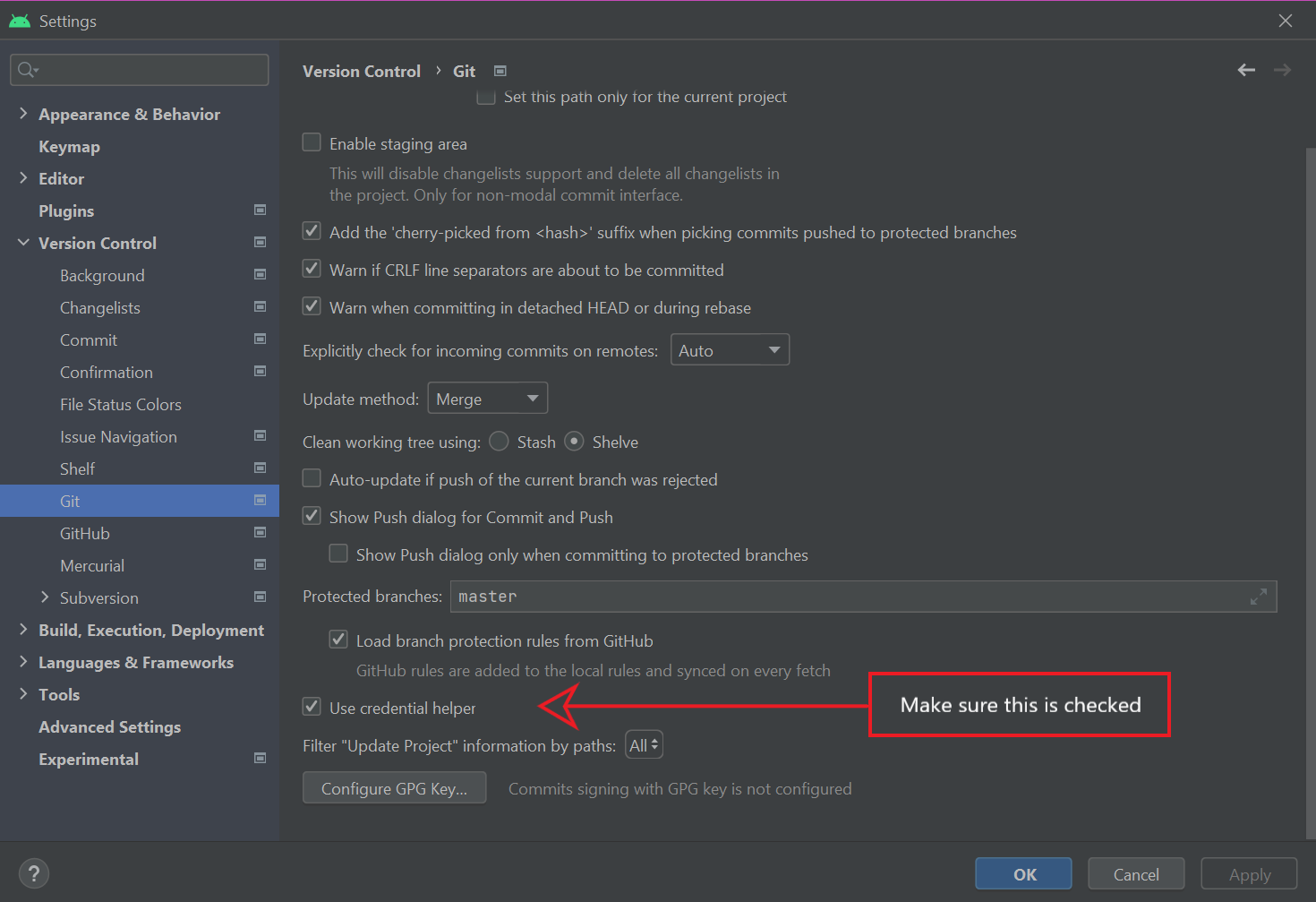TL;DR: check if you can read/write to /dev/tty. If no and you have used su to open the shell, check if you have used it correctly.
I was facing the same problem but on Linux and I have found the issue. I don't have my credentials stored so I always input them on prompt:
Username for 'https://github.com': foo
Password for 'https://[email protected]':
The way how git handles http(s) connections is using /usr/lib/git-core/git-remote-https
you can see strace here:
stat("/usr/lib/git-core/git-remote-https", {st_mode=S_IFREG|0755, st_size=1366784, ...}) = 0
pipe([9, 10]) = 0
rt_sigprocmask(SIG_SETMASK, ~[RTMIN RT_1], [], 8) = 0
clone(child_stack=NULL, flags=CLONE_CHILD_CLEARTID|CLONE_CHILD_SETTID|SIGCHLD, child_tidptr=0x7f65398bb350) = 18177
rt_sigprocmask(SIG_SETMASK, [], NULL, 8) = 0
close(10) = 0
read(9, "", 8) = 0
close(9) = 0
close(5) = 0
close(8) = 0
dup(7) = 5
fcntl(5, F_GETFL) = 0 (flags O_RDONLY)
write(6, "capabilities\n", 13) = 13
fstat(5, {st_mode=S_IFIFO|0600, st_size=0, ...}) = 0
read(5, "fetch\noption\npush\ncheck-connecti"..., 4096) = 38
write(6, "option progress true\n", 21) = 21
read(5, "ok\n", 4096) = 3
write(6, "option verbosity 1\n", 19) = 19
read(5, "ok\n", 4096) = 3
stat(".git/packed-refs", {st_mode=S_IFREG|0664, st_size=675, ...}) = 0
lstat(".git/objects/10/52401742a2e9a3e8bf068b115c3818180bf19e", {st_mode=S_IFREG|0444, st_size=179, ...}) = 0
lstat(".git/objects/4e/35fa16cf8f2676600f56e9ba78cf730adc706e", {st_mode=S_IFREG|0444, st_size=178, ...}) = 0
dup(7) = 8
fcntl(8, F_GETFL) = 0 (flags O_RDONLY)
close(8) = 0
write(6, "list for-push\n", 14) = 14
read(5, fatal: could not read Username for 'https://github.com': No such device or address
"", 4096) = 0
--- SIGCHLD {si_signo=SIGCHLD, si_code=CLD_EXITED, si_pid=18177, si_uid=1000, si_status=128, si_utime=6, si_stime=2} ---
exit_group(128) = ?
+++ exited with 128 +++
So I tried to call it directly:
echo "list for-push" | strace /usr/lib/git-core/git-remote-https my
and the result:
poll([{fd=3, events=POLLIN|POLLPRI|POLLRDNORM|POLLRDBAND}], 1, 0) = 1 ([{fd=3, revents=POLLIN|POLLRDNORM}])
recvfrom(3, "\27\3\3\1\32", 5, 0, NULL, NULL) = 5
recvfrom(3, "\307|4Q\21\306\334\244o\237-\230\255\336\25\215D\257\227\274\r\330\314U\5\17\217T\274\262M\223"..., 282, 0, NULL, NULL) = 282
openat(AT_FDCWD, "/dev/tty", O_RDONLY) = -1 ENXIO (No such device or address)
openat(AT_FDCWD, "/usr/share/locale/locale.alias", O_RDONLY|O_CLOEXEC) = 4
fstat(4, {st_mode=S_IFREG|0644, st_size=2995, ...}) = 0
read(4, "# Locale name alias data base.\n#"..., 4096) = 2995
read(4, "", 4096) = 0
close(4) = 0
openat(AT_FDCWD, "/usr/share/locale/en_US/LC_MESSAGES/libc.mo", O_RDONLY) = -1 ENOENT (No such file or directory)
openat(AT_FDCWD, "/usr/share/locale/en/LC_MESSAGES/libc.mo", O_RDONLY) = -1 ENOENT (No such file or directory)
openat(AT_FDCWD, "/usr/share/locale-langpack/en_US/LC_MESSAGES/libc.mo", O_RDONLY) = -1 ENOENT (No such file or directory)
openat(AT_FDCWD, "/usr/share/locale-langpack/en/LC_MESSAGES/libc.mo", O_RDONLY) = -1 ENOENT (No such file or directory)
write(2, "fatal: could not read Username f"..., 83fatal: could not read Username for 'https://github.com': No such device or address
) = 83
exit_group(128) = ?
+++ exited with 128 +++
And here it came to me:
openat(AT_FDCWD, "/dev/tty", O_RDONLY) = -1 ENXIO (No such device or address)
...
write(2, "fatal: could not read Username f"..., 83fatal: could not read Username for 'https://github.com': No such device or address
) = 83
git-remote-https tries to read credentials via /dev/tty so I tested if it works:
$ echo ahoj > /dev/tty
bash: /dev/tty: No such device or address
But in another terminal:
# echo ahoj > /dev/tty
ahoj
I knew I switched to this user using su so I exited the shell to see how and found out I used command su danman - so I tested it again:
~# su danman -
bash: cannot set terminal process group (-1): Inappropriate ioctl for device
bash: no job control in this shell
/root$ echo ahoj > /dev/tty
bash: /dev/tty: No such device or address
I probably ignored the message and continued working but this was the reason.
When I switched using the correct su - danman everything worked fine:
~# su - danman
danman@speedy:~$ echo ahoj > /dev/tty
ahoj
After this, git started working correctly



git config --global user.name "Your Name Here"– IchabodNo such file or directory, it is better to assume that the error just shows that you need to add authentication to your command. (Because it is a private repo etc..) For example, by using a Private Access Token. – Trevelyan